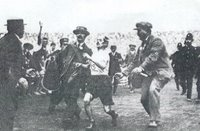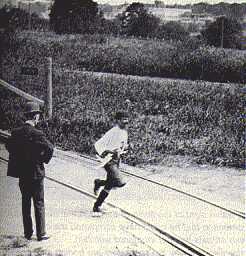Run, Dorando, Run

Dorando Pietri was born on this day in 1885 in Mandrio, Italy.
Pietri was a candy-maker who took up cycle racing in 1904. The following year he switched to running and won his first Italian marathon title.
Though he did not finish in the 1906 Olympic marathon in Athens, he was a sentimental favorite as the 1908 Olympic marathon began at Windsor Castle in England. A half-mile from the Olympic Stadium at Shepard's Bush where the 26-mile race was to end, Pietri overtook South African Charles Heffron, and was the first to enter the packed Stadium. The fast pace of the race had taken its toll on Pietri, however -- he appeared dazed and began running around the Stadium track in the wrong direction. After only a few yards, he collapsed. Zealous British officials, then feuding with the American team and noting that American Johnny Hayes had also passed Heffron and would win if Pietri failed to finish, leaped to their feet, picked up Pietri and, after Pietri collapsed several more times, virtually dragged him around the Stadium track in the right direction and declared Pietri the winner. The Americans lodged a protest, resulting in Pietri's disqualification and Hayes being declared the winner.
Nevertheless, Pietri's valiant struggle at the end of a hard fought race captivated the public imagination. The following day, Queen Alexandra, who had been present at the finish, presented Pietri with a special gold cup. In the U.S., he became the latest hero in the cult of the underdog. Irving Berlin wrote a song about him, and Pietri was invited to appear on the New York vaudeville stage (on a bill featuring boxer Jack Johnson and cartoonist Rube Goldberg), where the story of the Olympic marathon was told by a professional lecturer as Pietri stood awkwardly by, not knowing a word of English.
Meanwhile, Pietri turned professional, beating Hayes twice in marathons held in New York; he even beat two opponents on horseback on his way to winning 50 of 69 professional marathons. Eventually, Pietri retired to Italy where he drove a taxi and received a pension from the government to scout for new marathon runners. He died on February 7, 1942 in San Remo, Italy.





